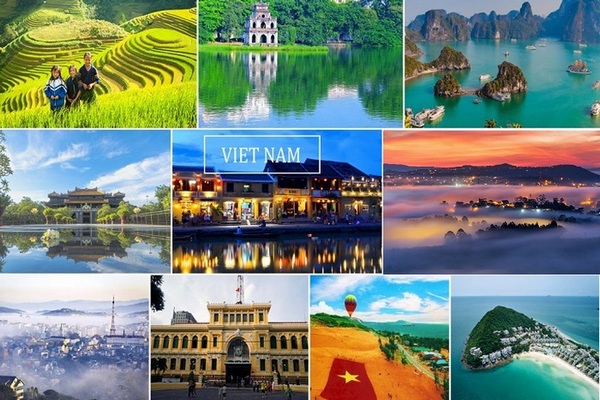
Discover information on Vietnam’s entry prerequisites, such as visa classifications for entering the country, the duration of passport validity required for entry, regulations concerning visa exemption, the process of obtaining a visa upon arrival, the application procedure for a Vietnam e-visa, the prerequisites for tourism entry, and the requirements for obtaining a business visa. Additionally, locate details on the procedures for extending a Vietnam visa.
Vietnam visa prerequisites
To enter Vietnam, most travelers are required to have a visa. The specific requirements for a Vietnam visa can vary depending on your nationality and the purpose of your visit. However, here are some general guidelines:
- Visa Exemption: Citizens of certain countries may be exempt from obtaining a visa for a specific period. These exemptions typically apply to short visits or diplomatic purposes. Check if your country is eligible for visa exemption.
- Visa Types: There are various types of visas available, including tourist visas, business visas, and work visas. Choose the appropriate visa category based on your purpose of travel.
- Visa Validity: Ensure that your passport is valid for at least six months beyond your planned departure date from Vietnam. Different visa types have varying durations of stay, so check the validity period before applying.
- Application Process: You can apply for a Vietnam visa through the Vietnamese embassy or consulate in your home country or via an online visa application system. Each method may have different requirements and processing times.
- Required Documents: Typical documents include a completed visa application form, a valid passport, passport-sized photos, and visa fees. Additional documents such as invitation letters, flight itineraries, or hotel reservations may be necessary depending on the type of visa you are applying for.
- Visa on Arrival (VOA): If you meet the eligibility criteria, you may apply for a VOA. This requires pre-approval from the Vietnamese immigration department and obtaining a visa approval letter before arrival. Upon arrival in Vietnam, you’ll need to present this letter, pay the visa stamping fee, and complete the entry procedures.
- Visa Extension: If you wish to extend your stay in Vietnam, you can apply for a visa extension at the local immigration office. However, not all visa types can be extended, so check the specific rules of your visa category.
It’s important to note that visa requirements can change, so it’s advisable to check the latest information from the nearest Vietnamese embassy or consulate or consult a reliable visa service before making travel arrangements.
Different categories of visas available for entry into Vietnam.

There are several visa types available for entering Vietnam:
- Tourist Visa: This is suitable for those visiting Vietnam for tourism purposes. It can be obtained for single or multiple entry, with varying durations of stay.
- Business Visa: If you’re traveling to Vietnam for business-related activities, such as attending conferences or meetings, you’ll need a business visa. It can also be obtained for single or multiple entry.
- Work Permit: If you’re planning to work in Vietnam, you’ll need a work permit in addition to a business visa. The work permit allows you to legally work and reside in the country.
- Student Visa: For individuals pursuing education in Vietnam, a student visa is required. You’ll need an acceptance letter from a recognized educational institution in Vietnam to apply for this visa.
- Diplomatic and Official Visas: These visas are issued to diplomats, government officials, or individuals traveling on official duties endorsed by their respective governments.
- Transit Visa: If you have a layover in Vietnam and plan to leave the airport during your transit, you may need a transit visa. This allows you to stay in Vietnam for a limited period before continuing your journey.
It’s important to note that visa requirements and application processes can vary depending on your nationality. It is recommended to check with the nearest Vietnamese embassy or consulate for the most up-to-date information and specific requirements for your situation.
Passport validity for entry into Vietnam

Passports must be valid for at least six months beyond the date of entry into Vietnam. It is important to ensure that your passport meets this requirement before traveling to Vietnam.
Vietnam’s visa exemption policy

Visa exemption in Vietnam allows citizens of certain countries to enter and stay in Vietnam for a specific period without obtaining a visa. The length of stay and conditions vary depending on the nationality. Currently, citizens from several countries, including Japan, South Korea, Russia, and most ASEAN countries, can visit Vietnam without a visa for a certain number of days. It’s important to check the latest regulations and requirements as they may change over time.
Vietnam offers the convenience of obtaining a visa upon arrival.

Visa on arrival for Vietnam allows eligible travelers to obtain their visa upon arrival at designated airports in Vietnam. To apply, you typically need to pre-arrange an approval letter from a Vietnamese travel agency or tour operator. This letter, along with your passport, completed visa application form, and visa stamping fee, should be presented upon arrival. The immigration authorities will then issue your visa, allowing you to enter Vietnam. It’s important to check the specific requirements and procedures beforehand to ensure a smooth process.
Vietnam e-visa application process
The Vietnam e-visa application process involves the following steps:
- Online Application: Visit the official website of the Vietnamese Immigration Department and complete the online application form for an e-visa. Provide accurate personal information and travel details.
- Required Documents: Prepare scanned copies of your passport biodata page and a recent passport-sized photograph (in JPEG format). Make sure the passport has at least six months of validity remaining.
- Application Fee: Pay the non-refundable e-visa processing fee online using a valid credit or debit card.
- Processing Time: Wait for the application to be processed. Typically, it takes around three working days. However, processing times can vary, so it’s advisable to apply well in advance of your intended travel date.
- E-visa Issuance: Once approved, you will receive an email notification with an electronic visa approval letter attached. Print out this letter, as you will need to present it upon arrival in Vietnam.
- Entry into Vietnam: Upon arrival at a designated port of entry in Vietnam (airport or land checkpoint), present your printed e-visa approval letter, passport, and any supporting documents if requested by the immigration officer.
- Visa Sticker: The immigration officer will verify your documents and affix the visa sticker to your passport, allowing you entry into the country.
It’s important to note that the e-visa is only applicable for certain nationalities and for specific purposes of travel, such as tourism or business. Be sure to double-check the eligibility criteria and requirements before applying for a Vietnam e-visa.
The prerequisites for visiting Vietnam as a tourist.
The entry prerequisites for tourism in Vietnam may differ based on your nationality. Generally, visitors must possess a valid passport with at least six months of remaining validity beyond their intended departure date. Additionally, most travelers need to acquire a visa prior to arrival. Various types of visas are available, including tourist visas and e-visas. Tourist visas typically permit stays of up to 30 days, while e-visas allow for a single entry and can be valid for 30 days. It is essential to review the specific requirements and application process based on your citizenship. Some nationalities have visa exemption agreements allowing for shorter stays without a visa, usually up to 15 days, but these exemptions have specific criteria. Checking eligibility beforehand is advisable. For the most accurate and up-to-date information regarding entry requirements, visa applications, and any COVID-19 related travel restrictions, it is recommended to contact the nearest Vietnamese embassy or consulate, or visit the official website of the Vietnamese immigration department.
Business visa requirements for Vietnam
To obtain a business visa for Vietnam, you typically need the following requirements:
- Valid Passport: Your passport should have at least six months of validity remaining from the date of entry into Vietnam.
- Visa Application Form: Complete the visa application form provided by the Vietnamese embassy or consulate in your country.
- Invitation Letter: Obtain an invitation letter from a company or organization in Vietnam confirming the purpose and duration of your visit.
- Approval Letter: For some nationalities, you may need to obtain an approval letter issued by the Vietnamese Immigration Department. This letter allows you to pick up your visa upon arrival at a Vietnamese airport.
- Passport Photos: Provide two recent passport-sized photos that meet the specifications set by the Vietnamese authorities.
- Visa Fee: Pay the required visa processing fee. The fee amount varies depending on the type of visa and your nationality.
- Proof of Travel: Present evidence of round-trip air tickets or itinerary showing your intended entry and exit dates from Vietnam.
- Accommodation Details: Provide proof of accommodation arrangements during your stay, such as hotel reservations or an invitation from a host in Vietnam.
- Financial Means: Show proof of sufficient funds to cover your expenses while in Vietnam.
- Health Insurance: Some countries may require travelers to have health insurance coverage during their visit. Check if this applies to your situation.
It’s important to note that visa requirements can vary depending on your nationality and the specific circumstances of your visit. It is recommended to contact the nearest Vietnamese embassy or consulate or consult with a reputable travel agency to ensure you have the most up-to-date and accurate information for obtaining a business visa to Vietnam.
The process of extending a visa for Vietnam.
To extend a Vietnam visa, follow these procedures:
- Contact the nearest Immigration Office in Vietnam before your current visa expires.
- Prepare the required documents, which typically include your passport, completed application form, and visa extension fee.
- Submit the application and supporting documents to the Immigration Office.
- Pay the visa extension fee as instructed by the authorities.
- Wait for the processing of your application. The duration can vary, but it usually takes several working days.
- Collect your passport with the extended visa from the Immigration Office once it is ready.
It is important to verify the most recent requirements and procedures for extending your visa by contacting the appropriate authorities or referring to an official source like the Vietnam Immigration Department, as visa extension processes may undergo changes.

Leave a Reply